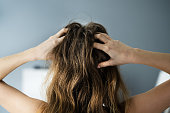Nail Damage Due To These Reasons.
Common causes of nail problems include injuries, infections, and skin conditions such as eczema and psoriasis. Causes of nail problems include trauma, poor footwear, poor circulation, poor nervous system and disease. A podiatrist can effectively treat toenail problems.
It is normal for nails to:
break or break (break) quickly as you age, loosen itself, and fall if injured. Nails last for 18 months.
Causes of angular nail problems
Your hands are often in water or soap
fungal nail infection thyroid
diabetes
heart, lung or liver disease Check the side effects of the medications you are taking .
The most common cause of nail cracking is something that happens to everyone: aging. It is more common in women over the age of 60, but it can also affect men.
If your cracked nails are related to aging, you may also notice yellowing at the base.
Although you can't turn back the clock, you can take better care of your efforts. Apply urea cream or mineral oil to your fingernails and toenails before going to bed, and wear cotton sheets. Apply the cream after washing your hands or showering during the day. If this is not enough, your dermatologist may recommend a more intensive treatment.
Anemia
The body needs iron to make healthy red blood cells that can carry oxygen throughout the body.
Pregnancy may increase the risk of anemia. Also some conditions like ulcers and cancer.
If low thyroid hormone levels cause cracked nails, you may also notice:
skin on the palms of your hands or the heels of your feet. give your body hormones that your thyroid can't make.
All of the above causes damaged nails.






.jpg)













